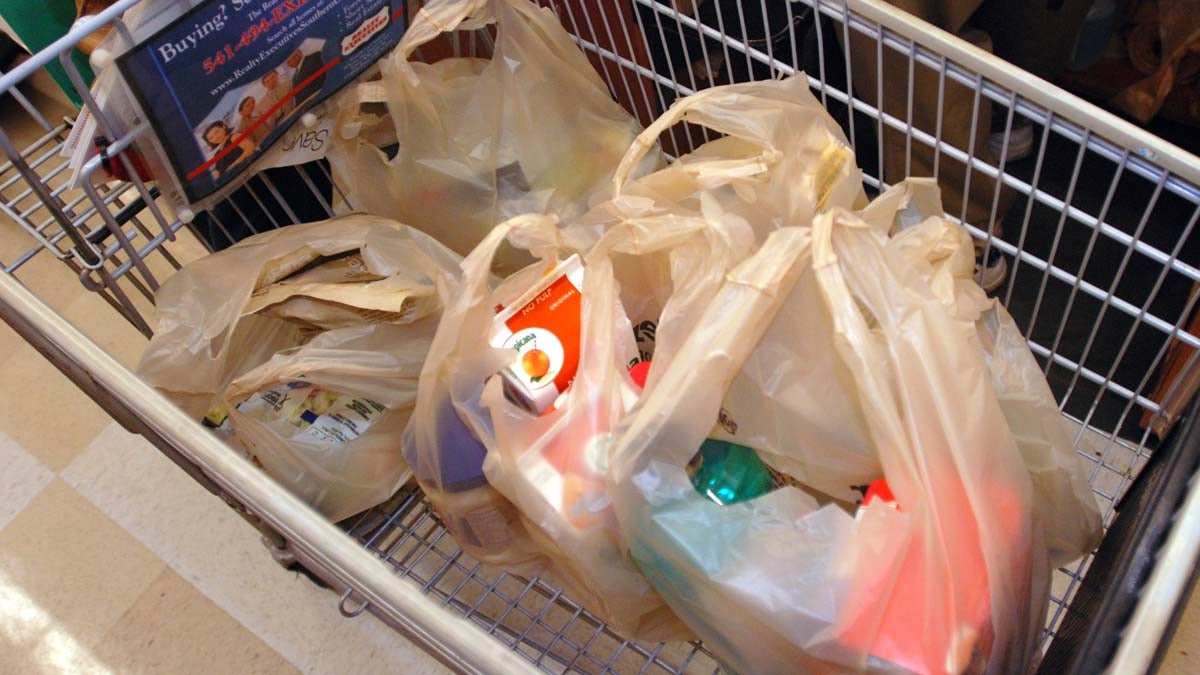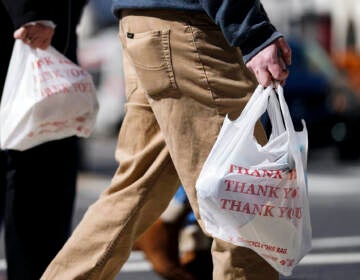Environmentalists cry foul as Philly’s plastic bag ban delayed
The six month delay in banning single-use plastic bags comes after the pandemic made outreach to affected small businesses impossible, city officials said.

Groceries in plastic bags inside a shopping cart. (AP file photo)
Single-use plastic bags are hard to get rid of in Philadelphia.
For a second time, Mayor Jim Kenney delayed the implementation of a bill to eliminate plastic bags in stores, restaurants, delivery services — and ultimately the city’s streets and waterways — for another six months.
Kenney’s administration said the implementation of the regulation, signed by the mayor in December 2019, will be postponed another six months to July 2021 because of the impacts of the pandemic on the business community.
“We know the climate crisis and plastic pollution remain two very serious threats to our planet and society, even during the global pandemic. However, we realize that this law will only be successful if there is widespread messaging to our diverse business owners, effective enforcement, and most importantly, partnership among all stakeholders and communities,” city officials said in a press release.
Advocates who have been fighting for the legislation to pass and be implemented for more than a decade disagree.
“Kenney’s move is a loss for businesses,” said Logan Welde, staff attorney for the Clean Air Council.
Philadelphians use about one billion plastic bags a year, which costs retailers about $20 million a year, according to Welde’s research. Banning them and encouraging customers to bring their own bags could technically eliminate that cost.
And although some businesses might want to replace them with paper bags, which are not included in the ban and are almost twice as expensive, Welde argues that’s not mandatory and that they could decide to charge a fee for them.
Eliminating single-use plastic bags will also save taxpayer dollars. The city spends between $9 million and $12 million a year removing plastic bags from the streets, sewers, and waterways, according to the Clean Air Council. They also account for over 10,000 hours of lost staff time at recycling facilities.
“It costs businesses to purchase these bags — which … are ‘free,’ when in fact, they’re anything but free. They cost businesses time and money, it costs communities, and they cost the city. So, this is a lose-lose proposition by the mayor,” Welde said.
The decision was announced by the city on Dec. 30, two days before the bill was set to be implemented. With the bill now going into effect on July 1, the same day a controversial extension of a state block on plastic bag bans expires, enforcement gets pushed back for a whole year to April 1, 2022.
According to the new timeline, businesses will be required to inform customers of the upcoming ban by July 31, 2021. Single-use plastic bags will be prohibited starting on October 1, followed by a six-month grace period where warnings will be issued for businesses failing to comply.
Despite the pandemic, a similar ban on plastic bags started being enforced last October in New York and in Delaware at the beginning of this year.
“I don’t think anyone’s probably more disappointed than I am,” said Christine Knapp, director of the Philadelphia’s Office of Sustainability, who has been working on the issue since 2005.
Knapp’s office was tasked to conduct or commission a study on bag use by retailers six months before and six months after the law went into effect according to the bill. But she said the pandemic made necessary steps of the implementation not possible.
“It basically just no longer felt realistic to be able to effectively implement a new ordinance that really would thrive on having the ability to do outreach and education, both with the small business community and with customers,” Knapp said.
Advocates of the bill said they were informed a couple of days before the announcement but not included in the conversations. Knapp said city agencies involved in the process including Commerce, Sustainability, Streets, and Licenses & Inspections made the decision with City Council.
“The administration did reach out to let us know what they wanted to do … with this legislation”, said City Councilmember Mark Squilla in an email.
Squilla introduced the bill in June 2019 as the fourth attempt in 13 years to ban plastic bags.
“It’s like Groundhog Day with this bill,” said Stephanie Wein, from the nonprofit PennEnvironment.
The plastics industry has been pushing the delay of single-use plastic-bag bans all across the country, arguing they’re safer than reusable bags during the coronavirus pandemic, but there is no scientific evidence supporting that statement. Scientists say the studies cited by the industry have “questionable applicability.”
“We’re so disappointed that the current administration just keeps kicking the can down the road on important environmental policy that passed City Council overwhelmingly. It’s widely supported by the general public, and is implemented in our neighboring states,” said Wein.
Knapp said advocates should rest assured that the change they want to see will eventually come.
“We will have a ban on plastic bags, the legislation has passed, we will implement it as soon as we can,” Knapp said.

Subscribe to PlanPhilly
WHYY is your source for fact-based, in-depth journalism and information. As a nonprofit organization, we rely on financial support from readers like you. Please give today.






